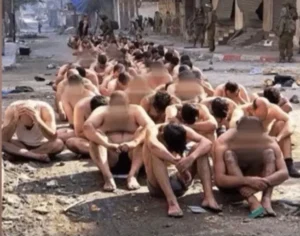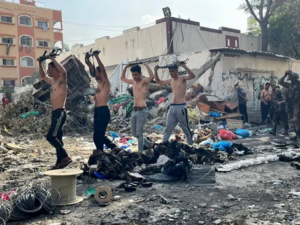Gazans disappear in Israeli military custody. The army claims it doesn’t know where they are

Palestinian men and boys stripped and detained by Israeli soldiers in northern Gaza in December 2023
Hagar Shezaf reports in Haaretz on 31 December 2024:
Since the outbreak of the war, the fate of many Gazans who were last seen in the custody of Israeli military (IDF) remains unknown. The army claims it has “no information” about them being detained or arrested. However, the last time they were seen, they were being detained or arrested by Israeli troops.
In recent months, Palestinians and human rights organizations have filed 27 petitions to find out what happened to the missing people. Though most were rejected, some of the petitions pushed the army to conduct further investigations. They revealed that some people, on whom IDF previously claimed to have no data, are either held in Israeli detention facilities or have died.
Abdel Karim Al-Shana, 39, father of six, was arrested in late January 2024 while crossing an IDF checkpoint south of Khan Yunis, after the army had ordered local residents to evacuate to Muwasi (classified by IDF as “safe zone” despite the ongoing attacks there, H.S.). Not having any news from Al-Shana for five months, his family was desperately looking for him until they heard from a prisoner who was just released.
“He told us he had seen him in Ashkelon [in the Shikma detention facility] where they had no mattresses. He said that he had been tortured,” his niece Doha, who lives in the West Bank, says crying over the phone. When the family tried to arrange for a lawyer to visit him, the Israel Prison Service claimed that he was being held in Ofer prison. However, once the family contacted the IDF control center for incarcerations, they heard that there is “no information” on his arrest or of him ever being held in custody. The family received the same response upon a second inquiry.
Al-Shana’s family, still residing in Gaza, went to great lengths to locate him. “We contacted the prisoners’ office, the Red Cross, Addameer [Prisoner Support and Human Rights Association, a Palestinian organization that aids prisoners], and every organization we could think of,” Doha says. “We searched for released prisoners, and whenever we heard about new detainees being released we went to the hospitals to ask if they had seen him. We talked to each and every one of them. We went to schools [that are being used as shelters], and if there was a freed prisoner there, we tried to talk to him,” she adds. Al-Shana’s 17-year-old son had also been arrested and was visited by a lawyer at Megiddo prison.
Last September, HaMoked: Center for the Defence of the Individual, a human rights NGO assisting Palestinians living under the Israeli occupation, filed a High Court petition demanding information on Al-Shana’s whereabouts from the authorities. Only then did the state reveal that he was being held in Ofer prison under criminal proceedings, and that a lawyer visited him in May 2024 − his family was unaware of any of this. The state claimed that the response previously provided to the family, which said there was no information on his whereabouts, “contained a mistake.”
The ruling said that the authorities’ error “raises concern” and that a similar case there had been previously brought to court. The petition, however, was rejected. Shin Bet security service refused to comment to Haaretz on the charge Al-Shana is facing. However, a source in defense establishment says he was arrested on suspicion of involvement in terrorist activity.
Since the start of the war, many Gazans detained by the military were brought to detention facilities in Israel, while others have been held within Gaza. Most were captured under the Incarceration of Unlawful Combatants Law, which currently allows to detain people for 45 days without a lawyer’s visit, which reflects an improvement to a previous version of the law that denied them access to lawyer for up to 180 days. Others, like Al-Shana, were arrested under criminal proceedings.
For many months, the state refused to provide any information on the detainees to their families and also denied Red Cross representatives to visit the detention facilities in Israel. Due to petitions filed by HaMoked, in May, the state provided an email address allowing to make an appointment for the prisoner with a lawyer after the first 45 days of detention, and thus to find out if he were indeed detained and, if so, where. From May to October, HaMoked filed 901 requests to locate prisoners. 501 received a response on the place of detention, and 400 said, “There is no information on arrest or detention.”

Palestinian detainees in Beit Lahia, northern Gaza, in 2023
In some of these cases there’s a probability that the people in question are not held by the military, and the families lost contact with them due to other war-related circumstances. In 27 such cases the families had indications that their relatives were indeed detained or last seen while in custody or being arrested in Gaza.
Thus, last May, when a Gazan man was arrested by IDF, his family contacted the army to hear the same response. However, two months later, after his release, he said that all that time he was being moved from place to place in Gaza, while in IDF custody.
In November, Haaretz reported on the case of Mounir Alfaqawi and his son Yassin when IDF first claimed they had no data on their arrest, but then changed their response after a petition was filed. The further state investigation discovered that both had died in detention. An internal police inquiry into their deaths is still open.
In this instance, too, the judges expressed, “concern with the mistake made by the military police.” Judge Khaled Kabub ruled: “Despite the heavy load borne by those who deal with these matters, or perhaps because of it, they must make sure to clearly ascertain the facts in each and every case before providing an answer.” He also said that “relevant bodies should investigate this serious incident and formulate procedures, given the discrepancy between the response provided in July and the response provided as a result of the petition. It is to be expected that those involved be in touch with representatives of the detainees’ families regarding the internal police investigation into the circumstances of their deaths.”
Another case regards the disappearance of the father of the Al-Ajur family and his five-year-old daughter. The girl’s mother, who wished to remain anonymous when speaking to Haaretz, says she last saw the two on March 24, in their relatives’ home near Shifa Hospital in Gaza City. Earlier they evacuated from the Tel al-Hawa neighborhood where they had been living before the war.
“We were under siege for a week, and on the seventh day, soldiers came into the house and opened fire. I was pregnant and was shot in the stomach. My husband was wounded in the leg, and my daughter was injured in the shoulder.” She says the soldiers took the girl into another room to tend to her injury. “They pointed their weapons at me and said, ‘You need to leave the house and head south.’ I asked them to give me my four-year-old son and left. Since then I don’t know what happened to my husband or daughter.”
When other relatives returned to the house two weeks later, they saw that it had been bombed, but were unable to locate bodies. The father and daughter vanished without a trace. A few months later, the mother suddenly got word of her husband, or so it seemed. “One prisoner told us that he saw him in the Negev [Ketziot] prison. But he couldn’t tell us anything about the injury or the state he was in,” she says.
She heard a similar report from another released prisoner. However, when the family attempted with the aid of HaMoked to make an official inquiry into the father and daughter’s whereabouts, they received a response that there was “no information” of their arrest. HaMoked’s petition on the matter was rejected by the High Court of Justice after the same response from the state. “Why do they say that he wasn’t arrested if released prisoners tell us that they heard his name?” the mother asks. “I want to know what happened after I left the house. Where did my husband and daughter disappear? What happened after that?”
In two other similar cases families heard from released prisoners that their relatives were in fact detained in Israel. Awad Nufal, a 68-year-old Gazan, was arrested in front of his family in January 2024. The army said it had “no information on his arrest” while other Gazans who were released from prison in Israel claimed they had seen Awad in Ofer prison and at the Anatot detention facility. Nur Abu al-Aoun was arrested in December 2023. A released relative of his said they had been detained in an interrogation facility in Shikma prison. Another released prisoner said he was with him later on in Ofer prison. In both cases, the High Court of Justice rejected the petitions after the state insisted that it had no information on the men’s arrest.
“Hundreds of people have disappeared after ending up in IDF custody. Either the army is refusing to provide information about these cases or, even more serious, soldiers are not documenting in any way how civilian population is being treated,” says Jessica Montell, director of HaMoked. “We have brought dozens of cases to the High Court, which declined to exercise any judicial oversight. Essentially, the High Court acts as a rubber stamp for whatever declaration the army and the prison service make in these cases. The fact that there is no one who will call the security services to order, unlike the previous wars, is leading to a situation in which there are grave violations of law and detainees disappear forever.”
Concerning the Al-Ajur family, the IDF Spokesperson says: “The incident described is not known to us. We emphasize that the father was not arrested or registered in any IDF detention facility.” The spokesperson declined to comment on all the other cases, as well as on the general complaint about the inability to locate detainees.
This article is reproduced in its entirety
